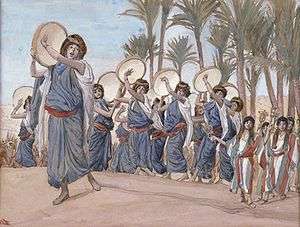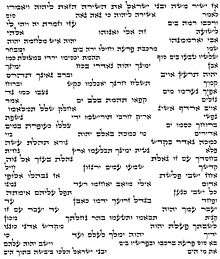Song of the Sea
The Song of the Sea (Hebrew: שירת הים, Shirat HaYam, also known as Az Yashir Moshe and Song of Moses, or Mi Chamocha) is a poem that appears in the Book of Exodus of the Hebrew Bible, at Exodus 15:1–18. It is followed in verses 20 and 21 by a much shorter song sung by Miriam and the other women. The Song of the Sea was reputedly sung by the Israelites after their crossing the Red Sea in safety, and celebrates the destruction of the Egyptian army during the crossing, and looks forward to the future conquest of Canaan.


The poem is included in Jewish prayer books, and recited daily in the morning shacharit services. The poem also comprises the first ode or hymn of the Eastern Orthodox canon, where it is known as the Song or Ode of Moses.[1] It is also used in the Roman Catholic, Eastern Orthodox, and other Christian liturgies[2] at the Easter Vigil when the history of salvation is recounted. These traditions follow Revelation 15:3 by calling it the "Song of Moses" (not to be confused with the Song of Moses in Deuteronomy).
The poem forms part of the sixteenth weekly Torah portion, or parshat Beshalach. It is one of only two sections of the Sefer Torah (Torah scroll) that is written with a different layout from the normal simple columns. The other section written differently is the Song of Moses at the end of Deuteronomy, in the 53rd weekly portion, or parshat Ha'azinu.
Origin
The Song of the Sea is noted for its archaic language. It is written in a style of Hebrew much older than that of the rest of Exodus. A number of scholars consider it the oldest surviving text describing the Exodus, dating to the pre-monarchic period. An alternative is that it was deliberately written in an archaic style, a known literary device.[3] Proposed dates range from the 13th to the 5th century BCE.[4]
Page layout
The Ashkar-Gilson manuscript is a fragment of a 7th or 8th century Torah scroll that contains the Song of the Sea. Some scholars have argued that the "brickwork" pattern of the Ashkar-Gilson version shows that the Masoretes accurately copied earlier manuscripts. This pattern was not used in the Dead Sea Scrolls.[5] A similar pattern is used in modern Torah scrolls.[6]
Text
| Masoretic Text | English translation (New International Version) |
|---|---|
|
אָ֣ז יָשִֽׁיר־מֹשֶׁה֩ וּבְנֵ֨י יִשְׂרָאֵ֜ל אֶת־הַשִּׁירָ֤ה הַזֹּאת֙ לַֽיהוָ֔ה וַיֹּאמְר֖וּ לֵאמֹ֑ר אָשִׁ֤ירָה לַֽיהוָה֙ כִּֽי־גָאֹ֣ה גָּאָ֔ה ס֥וּס וְרֹכְבֹ֖ו רָמָ֥ה בַיָּֽם
|
1 Then Moses and the Israelites sang this song to the Lord:
"I will sing to the Lord, 19 When Pharaoh's horses, chariots and horsemen went into the sea, the Lord brought the waters of the sea back over them, but the Israelites walked through the sea on dry ground. 20 Then Miriam the prophet, Aaron's sister, took a timbrel in her hand, and all the women followed her, with timbrels and dancing. 21 Miriam sang to them: Sing to the Lord, |
Ketuba of the Seventh Day of Pesah
The Ketubá del Seten Dia de Pesah (or כתובה ליום השביעי של פסח - Ketuba Le-yom Ha-shebi`i shel Pesah) is a liturgical poem in Ladino, describing Pharaoh's defeat in the Sea of Reeds. Most Jewish communities sing this poem on 21 Nisan, the seventh day of Passover. According to Jewish tradition, this is the day on which Pharaoh's army was drowned in the Sea of Reeds, and the Israelite people sang the Song of the Sea in gratitude for this victory.
Presumably, this text is called a ketuba ("marriage contract") because the relationship between God and the Jewish people is traditionally described as a marriage, and the splitting of the sea is considered to be an important event leading to that marriage, which ultimately took place 42 days later, at Mt. Sinai.
A tune for the Ladino poem along with the entire text itself can be found in Isaac Levy's Anthology of Sepharadic Hazzanut.[7]
Musical settings
The following settings exist for the Song of the Sea in the Catholic tradition:
- Cantique de Moïse (French) Étienne Moulinié.
- Canticum Moysis (Latin) Fernando de las Infantas.
- Cantemus Domino Ascanio Trombetti.
The following settings exist for the Song of the Sea in the Protestant tradition:
- Part Three of Handel's 1739 oratorio Israel in Egypt, entitled Moses' Song.
- Mirjams Siegesgesang (Miriam's Song of Triumph), Op. 136 by Franz Schubert.
A version of the song features in the 1998 animated film The Prince of Egypt. The text consists of a few selected lines and paraphrases from the Hebrew text inserted in the bridge of the song When You Believe.
Portions of the song are paraphrased in both of the melodic and textual variations of the popular African-American gospel music song, "O Mary Don't You Weep".
References
- The Psalter According to the Seventy (1987). Boston: Holy Transfiguration Monastery. ISBN 0-943405-00-9.
- e.g. Methodist Worship Book
- Thomas B. Dozeman (2009). Exodus. Wm. B. Eerdmans Publishing. p. 331. ISBN 978-0-8028-2617-6.
- Wong, Gregory T.K. (2007). "Song of Deborah as Polemic." Biblica, vol. 88, no. 1 p. 1.
- Hess, Richard (2016). The Old Testament: A Historical, Theological, and Critical Introduction. Baker. Retrieved 1 September 2019.
- The World's Greatest Book: The Story of How the Bible Came to Be. Museum of the Bible. p. 152. Retrieved 1 September 2019.
- Levy, Isaac (1965). Antologiya shel Hazzanut Sefaradit [Anthology of Sepharadic Hazzanut]. Three Pilgrimage Festivals. p. 409, #335.